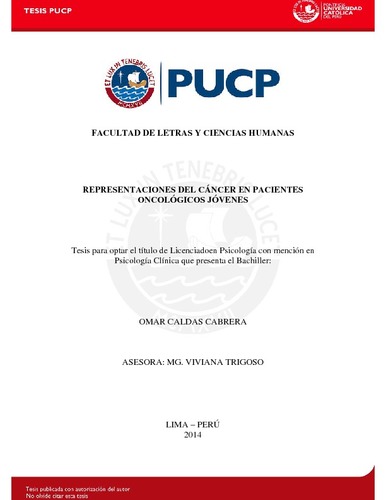| dc.contributor.advisor | Trigoso Obando, Viviana María | es_ES |
| dc.contributor.author | Caldas Cabrera, Omar | es_ES |
| dc.date.accessioned | 2015-04-28T21:07:31Z | es_ES |
| dc.date.available | 2015-04-28T21:07:31Z | es_ES |
| dc.date.created | 2014 | es_ES |
| dc.date.issued | 2015-04-28 | es_ES |
| dc.identifier.uri | http://hdl.handle.net/20.500.12404/5915 | |
| dc.description.abstract | La presente investigación tiene como objetivo conocer las representaciones del cáncer en un grupo de adultos jóvenes que han sido diagnosticados con esta enfermedad, recogiendo los aportes de dos tipos de instrumentos: la entrevista y la red de asociaciones.Para este propósito se evaluó a 30 jóvenes con edades entre 18 y 25 años (M= 20.93,DE=2.43) que estaban siendo atendidos en el Instituto Nacional de Enfermedades Neoplásicas (INEN). Se apreciandiversas asociaciones relacionadas al cáncer, tanto positivas como negativas, lo cual parece estar relacionado a experiencias previas con la enfermedad y a factores vinculados a la etapa del desarrollo de los participantes. Además, se encuentra que la red de asociaciones es un instrumento interesante al momento de evaluar representaciones por los contenidos evocados y el modo de acercamiento a esta enfermedad. | es_ES |
| dc.description.abstract | This research aims to discover the representations of cancer in a group of young adults who have been diagnosed with this disease, collecting contributions from two types of instruments: the interview and the associative network. For this purpose, we evaluated30 youths between 18 and 25 years (M = 20.93, SD = 2.43) who were being treated atInstitutoNacional de EnfermedadesNeoplásicas (INEN). Various associations related to cancer are appreciated, both positive and negative, which seems to be related to previous experiences with the disease and linked to the stage of development of participants. In addition, we find that the associative network is an interesting tool when evaluating representations by the content evoked and themode of approachingthis disease. | es_ES |
| dc.language.iso | spa | es_ES |
| dc.publisher | Pontificia Universidad Católica del Perú | es_ES |
| dc.rights | Atribución-NoComercial-SinDerivadas 2.5 Perú | * |
| dc.rights | info:eu-repo/semantics/openAccess | es_ES |
| dc.rights.uri | http://creativecommons.org/licenses/by-nc-nd/2.5/pe/ | * |
| dc.subject | Representación mental | es_ES |
| dc.subject | Cáncer | es_ES |
| dc.subject | Adultos jóvenes | es_ES |
| dc.title | Representaciones del cáncer en pacientes oncológicos jóvenes | es_ES |
| dc.type | info:eu-repo/semantics/bachelorThesis | es_ES |
| thesis.degree.name | Licenciado en Psicología Clínica | es_ES |
| thesis.degree.level | Título Profesional | es_ES |
| thesis.degree.grantor | Pontificia Universidad Católica del Perú. Facultad de Letras y Ciencias Humanas. | es_ES |
| thesis.degree.discipline | Psicología Clínica | es_ES |
| renati.discipline | 313026 | es_ES |
| renati.level | https://purl.org/pe-repo/renati/level#tituloProfesional | es_ES |
| renati.type | http://purl.org/pe-repo/renati/type#tesis | es_ES |
| dc.publisher.country | PE | es_ES |
| dc.subject.ocde | https://purl.org/pe-repo/ocde/ford#5.01.00 | es_ES |






